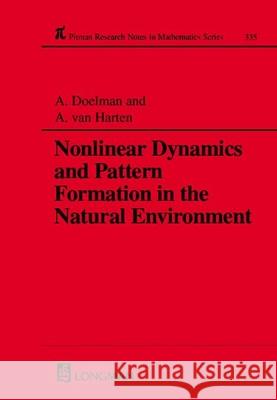Nonlinear Dynamics and Pattern Formation in the Natural Environment » książka
Nonlinear Dynamics and Pattern Formation in the Natural Environment
ISBN-13: 9780582273719 / Angielski / Twarda / 1995 / 344 str.
This Research Note aims to provide an insight into recent developments in the theory of pattern formation. In the last decade there has been considerable progress in this field, both from a theoretical and a practical point of view. Recent mathematical developments concern the study of the nonlinear stability of systems at near-critical conditions by an appropriate system of modulation equations. The complexity of the original problem can be reduced drastically by this approximation. Moreover, it provides unifying point of view for a wide range of problems. New applications of the theory arise in a multitude of scientific areas such as hydrodynamics, reaction-diffusion problems, oceanography, meteorology, combustion, geophysical and biological morphodynamics and semi-conductors.
This book is intended to show the interactions between the mathematical theory of nonlinear dynamics and the study of pattern generating phenomena in the natural environment. There is an intimate relationship between new insights in the mathematical aspects of nonlinear pattern formation and the comprehension of such phenomena. Therefore there are two partly overlapping main themes: one in which the emphasis is on generally applicable mathematical theories and techniques and one in which the phenomenology of pattern evolution in various areas is discussed.
The book comprises 19 contributions by experts in the field. Although the emphasis changes considerably from paper to paper, in each contribution the same two themes are present; all the authors have aimed to achieve a suitable balance between the mathematical theory and the physical phenomena.
Contents:
This Research Note aims to provide an insight into recent developments in the theory of pattern formation. In the last decade there has been considerable progress in this field, both from a theoretical and a practical point of view. Recent mathematical developments concern the study of the nonlinear stability of systems at near-critical conditions by an appropriate system of modulation equations. The complexity of the original problem can be reduced drastically by this approximation. Moreover, it provides unifying point of view for a wide range of problems. New applications of the theory arise in a multitude of scientific areas such as hydrodynamics, reaction-diffusion problems, oceanography, meteorology, combustion, geophysical and biological morphodynamics and semi-conductors.
This book is intended to show the interactions between the mathematical theory of nonlinear dynamics and the study of pattern generating phenomena in the natural environment. There is an intimate relationship between new insights in the mathematical aspects of nonlinear pattern formation and the comprehension of such phenomena. Therefore there are two partly overlapping main themes: one in which the emphasis is on generally applicable mathematical theories and techniques and one in which the phenomenology of pattern evolution in various areas is discussed.
The book comprises 19 contributions by experts in the field. Although the emphasis changes considerably from paper to paper, in each contribution the same two themes are present; all the authors have aimed to achieve a suitable balance between the mathematical theory and the physical phenomena.
Contents:











